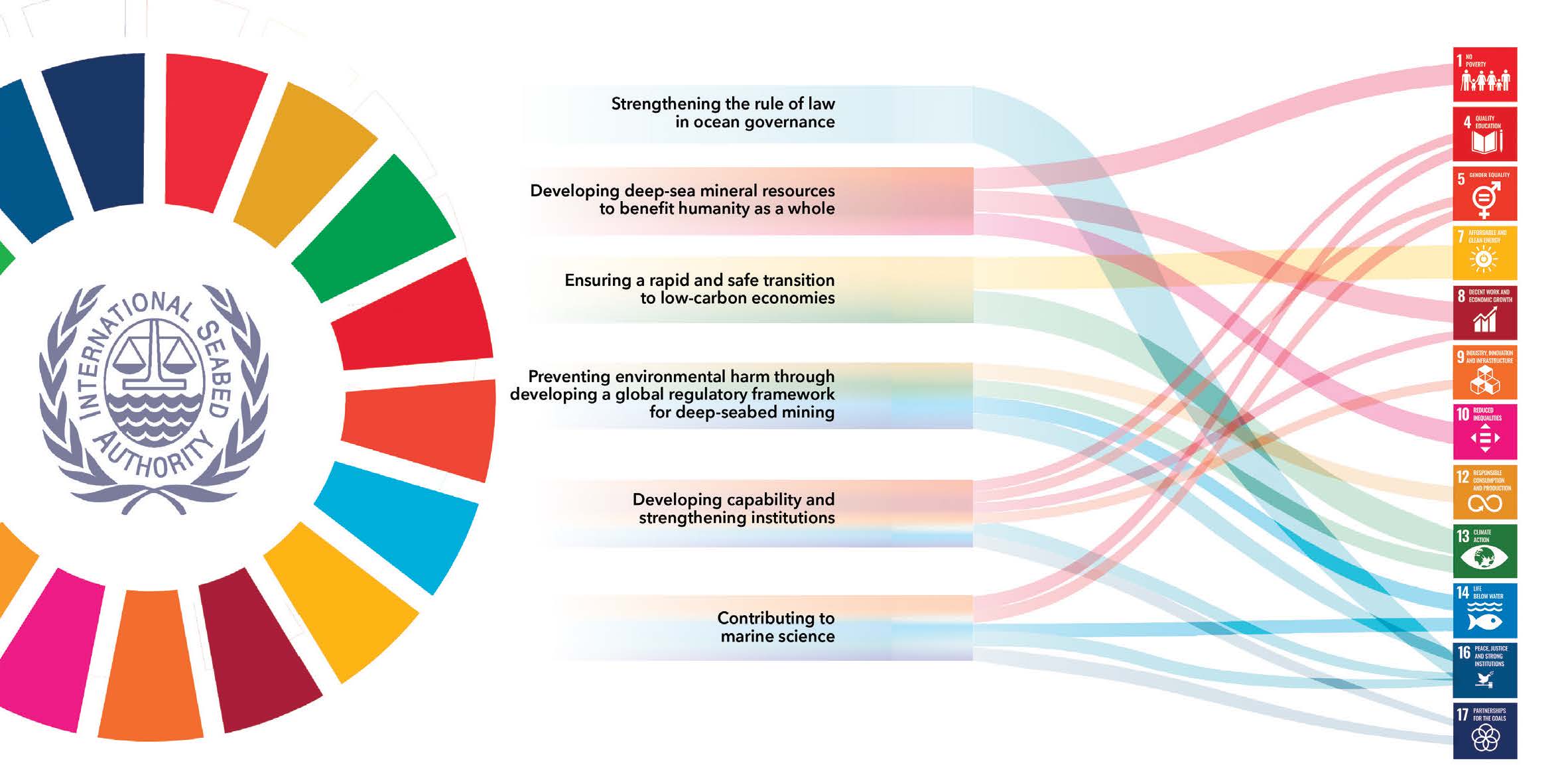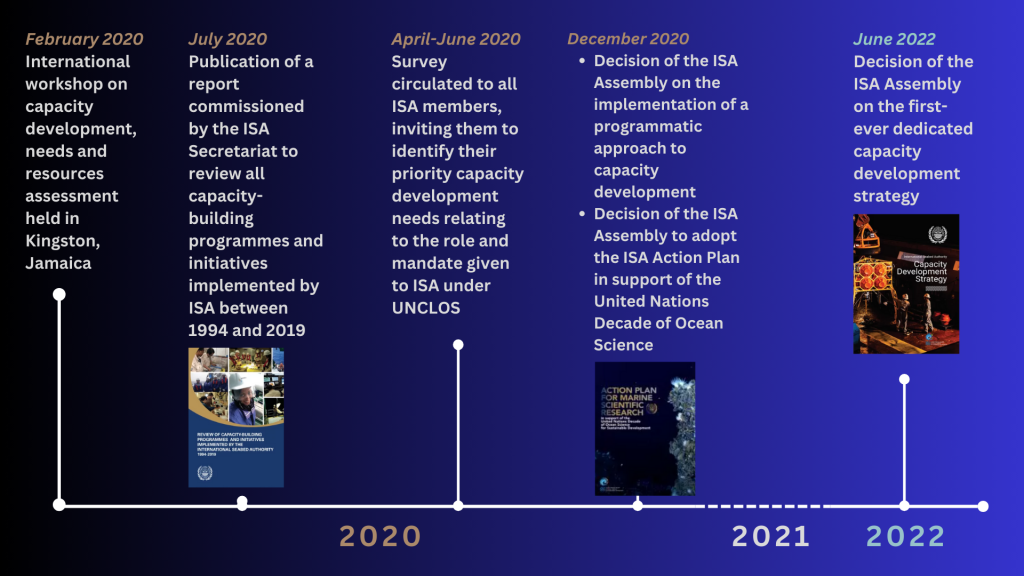Capacity-development, training and technical assistance
Strategic framework
The duty of ISA to design and implement mechanisms to build capacity for developing States, in accordance with its mandate under UNCLOS, is recognized in the ISA Strategic Plan for 2019-2023. Such mechanisms are designed and implemented to promote and encourage the transfer of technology to developing States (UNCLOS, Articles 144, 273, 274) and ensure the expansion of opportunities for activities in the Area (UNCLOS, Article 148). Strategic Direction 5 (Build capacity for developing States) and Strategic Direction 6 (Ensure fully integrated participation by developing States) of the Strategic Plan are aimed at accomplishing this objective.
As indicated in the High-Level Action Plan of ISA for 2019–2023 relating to the implementation of the Strategic Plan, one of the specific actions undertaken by the Secretariat in 2020 was to assist developing States, particularly geographically disadvantaged States, least developed countries, landlocked developing countries and small island developing States in identifying their needs (High-level action 5.1.1).
This was achieved through an incremental process consisting of a report commissioned by the ISA Secretariat in 2019 to review all capacity-building programmes and initiatives implemented by ISA between 1994 and 2019, the organization of an international workshop on “Capacity development, needs and resources assessment” organized in February 2020 in Kingston, Jamaica, and a survey circulated to all ISA members between April and June 2020 in which they were invited to identify their priority capacity development needs relating to the role and mandate given to ISA under UNCLOS (Review of Capacity-Building and Workshop Report). Building on the results of this process, the ISA Assembly formally adopted a decision in December 2020 relating to the implementation of a programmatic approach to capacity development for ISA (ISBA/26/A/18) in which it requested the Secretary-General to develop and implement a dedicated strategy for capacity development.
The ISA Capacity development strategy responds to that request and sets the core elements of capacity development programmes, projects and initiatives at ISA. This decision has been further complemented with the adoption of the Action Plan of the International Seabed Authority in support of the United Nations Decade of Ocean Science by the ISA Assembly in December 2020. Aligned with the Implementation Plan of the United Nations Decade of Ocean Science, the ISA’s MSR Action Plan is structured around six strategic research priorities. Strategic Research Priority 6 will specifically be developed to strengthen ISA’s current efforts and activities to develop its members’ capacities in marine scientific research.
ISA-Capacity Development Alumni Network (iCAN)
iCAN is a network of all former participants of ISA capacity development programmes. The network aims to promote and encourage the transfer of technology to developing States, while ensuring the expansion of opportunities for participation in activities in the Area. Additionally, iCAN, allows monitoring the midterm and long-term impact of training provided and enabling the Secretariat to use the expertise of former participants and trainees, where possible, as mentors, experts or consultants. Consequently, this is a step towards the Authority providing for the equitable sharing of financial and other economic benefits derived from activities in the Area.
Implementation
Capacity development programmes, projects and initiatives at ISA create the enabling conditions to build the capacities of many individuals while strengthening institutional capacities. Moreover, Capacity-building and training have been an integral feature of ISA’s activities since its
establishment. Since 2000, various programmes and initiatives have been developed and
implemented by ISA to strengthen the capacities of developing States and technologically less
developed States. (UNCLOS, Articles 143(3)(b), 144, 273 and 274). These include
- Deep DiplomaSea
- ISA Secretary General’s Award for Excellence in Deep-Sea Research.
- DeepDive e-Learning Programme
- Contractor’s Training Programme
- ISA internship programme
- ISA National Expert Deployment Programme
- ISA Joint Training and Research Centres
- Africa Deep Seabed Resources project
- Abyssal Initiative for Blue Growth project
- Women in Deep-Sea Research project (WIDSR)
- the ISA-Ifremer postdoctoral fellowship in deep-sea taxonomy
ISA Capacity Development Dashboard
This ISA capacity development dashboard provides access to detailed information on participation in different ISA capacity development initiatives. On the dashboard, there several filters and ways to view the data, e.g., per year, per country or region, gender and type of programme. Statistics about trainees from Least Developed countries (LDCs), Landlocked Developing Countries (LLDCs) and Small Island Developing States (SIDS) are also provided.
National focal points in charge of liaising with the secretariat on matters relating to capacity development
NAFOP-CD assists in increasing awareness within national ministries and pertinent agencies about the mandate given to ISA by the United Nations Convention on the Law of the Sea concerning capacity-building, capacity development, training and technical assistance. At the national level, NAFOP- CD also guarantees the spread of pertinent information, aids in pinpointing their countries’ requirements for technical assistance and identifies potential collaborators to execute training and capacity development programmes.
Contribution of ISA’s work on Capacity Development to the Sustainable Development Goals
The work of ISA on capacity development and institutional strengthening at ISA further contributes to Sustainable Development Goals 4 (quality education), 5 (gender equality), 8 (decent work and economic growth), 9 (industry, innovation and infrastructure), 14 (life below water), 16 (peace, justice and strong institutions) and 17 (partnerships for the Goals).






